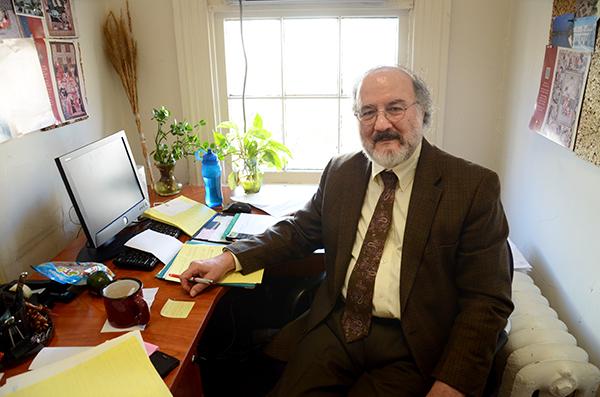Fatemeh Nasrollahi, a student in the master’s in Islamic studies program, wasn’t sure he’d be able to afford GW’s steep tuition when he was deciding where to enroll in graduate school.
But program director Mohammad Faghfoory had planned ahead: Faghfoory has fundraised independently to help bring in more money to his department and sway top recruits to come to GW.
“I really doubted whether this would be doable, or I’d better say affordable. GW is an expensive institution,” said Nasrollahi, who received $4,270 for his first academic year. “Dr. Faghfoory could, finally, get some fellowship for us. And that really affected my decision.”
Faghfoory started courting donors to support the program, which was launched about two years ago, when he said he grew tired of his top applicants not being able to afford GW. He’s so far helped students to earn fellowships that complement their financial aid.
He has reached out to his own network of family and friends, asking for donations to increase the scholarship pool he could offer students. And it’s worked: In the past three years, Faghfoory has raised about $500,000 to grow his program and support students looking to enroll.
Since he’s raising money for the program on his own, Faghfoory can use the donations for however the funds could benefit the program. But he plans to use most of it for financial relief to lure top students to the $1,490-per-credit-hour program.
He said he hopes that by bringing in more money for financial aid on his own, the University might also match or increase its contributions to student aid, Faghfoory said.
“Many schools welcome that kind of idea because tuition that the school gives is not something that it gets from its own pocket,” says Faghfoory. “It deducts from its income, but in return it attracts a lot of funds and more students who can at least pay half of the tuition from this fund.”
Without a broad alumni base, Faghfoory has asked relatives, former colleagues and members of the Muslim community for gifts. He hasn’t been able to travel to Muslim countries, like Iraq or Iran, where there are potential donors as much as he’d like because of political turmoil in the region.
Parisa Sajjadi, who is in her first semester at GW, said she also wouldn’t be able to afford tuition because the rial, Iran’s currency, doesn’t compare well to the U.S. dollar. With GW’s aid and the program’s package, she received about $4,700 for her first year at GW.
“I wouldn’t be able to afford my tuition and all of the expenses,” she said. “It would be very hard for a person like me, whose currency in comparison with the dollar is not good.”
Several departments use their own networks to bring in donations each year, University spokeswoman Maralee Csellar said. She added that Faghfoory understood how to take advantage of individual and alumni networks.
The University doles out financial aid to graduate departments based on the financial aid office’s review of each program’s applicant pool, Csellar said. GW gave $233 million in financial aid to undergraduates and graduate students last year.
“Graduate students are routinely supported by a number of sources including GW-funded fellowships, externally funded scholarships and research,” Csellar said. “All of these sources are important parts of our effort to build strong doctoral and master’s programs.”
Faghfoory has also used $80,000 of the funds he’s brought in to purchase a set of 3,500 volumes for Gelman Library, meant to be used in the program’s courses. The University contributed about $20,000 for that collection.
Tim Winkler, chief executive officer of fundraising firm the Winkler Group, said it’s not typical for professors to do their own fundraising, but that reaching out to individual donors in a personal way is proven to be successful.
Contacting potential donors who are directly interested in the field of study, like how Faghfoory has travelled to the Middle East to raise money, is considered the best strategy, Winkler said.
“The more he can include donors to the process and make himself accessible and make the donor involved, the more they might be willing donate,” he said.








